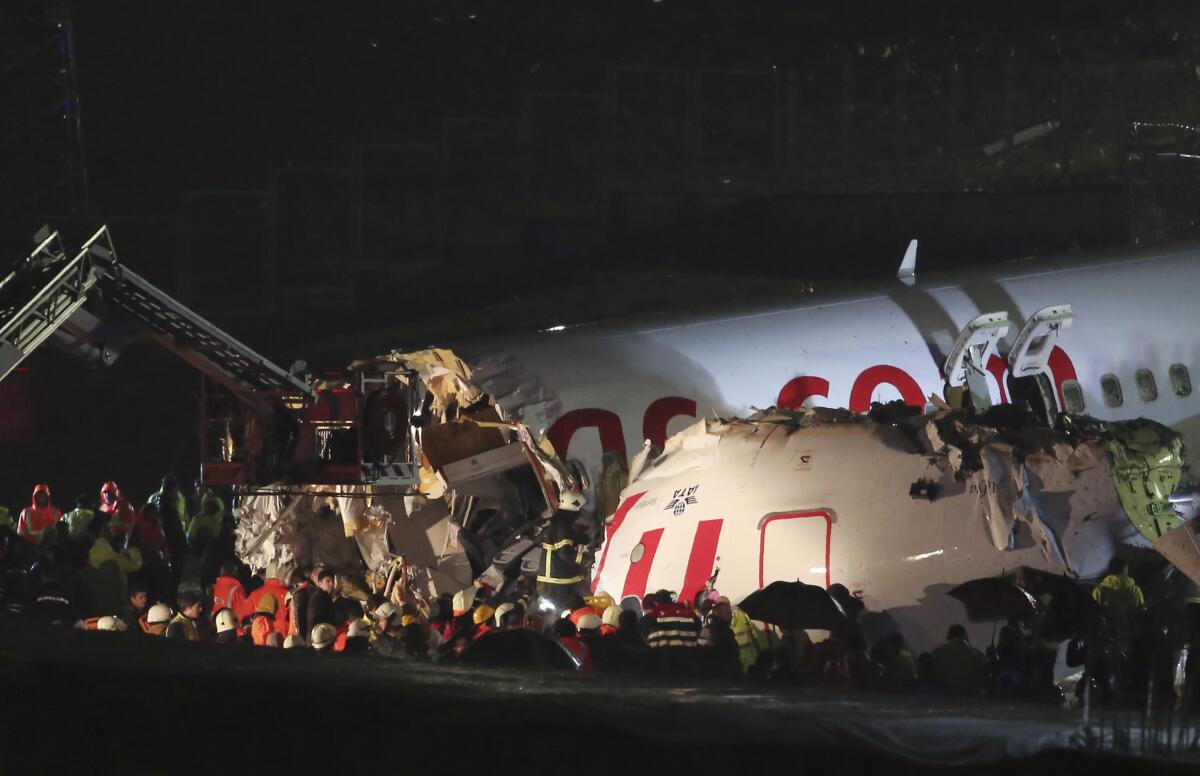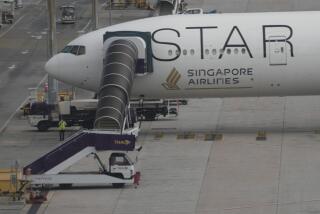One dead, dozens hurt as plane skids off Istanbul runway and breaks into pieces

ISTANBUL, Turkey — A Turkish airliner skidded off a runway, crashed into a ditch and broke apart while landing in bad weather Wednesday in Istanbul, killing one person and injuring dozens. Passengers had to scramble through the split fuselage to escape.
The aircraft, operated by low-cost carrier Pegasus Airlines, was arriving at Istanbul’s Sabiha Gokcen airport from the western Turkish city of Izmir with 177 passengers and crew on board when it had what the Transportation Ministry described as a “rough landing.”
In video obtained by the Associated Press, the wreckage of the plane was in a field adjacent to the end of the runway. The video shows heavy rain and strong winds at the time, with smoke coming from one of the engines. Passengers were climbing out of the plane onto its wings and away from the crash site.
Dozens of rescue crew members swarmed around the flood-lit fuselage, including around the cockpit, which had flipped over. The plane was a Boeing 737 that was 11 years old, according to the flight-tracking website Flightradar24.
Istanbul Gov. Ali Yerlikaya said the plane failed to “hold on to the runway” and skidded some 50-60 yards before it dropped into the ditch from a height of about 98 feet.
“We are deeply saddened ... (But) we are very happy that we escaped a greater accident,” Yerlikaya said, adding that the plane could have burst into flames.
Health Minister Fahrettin Koca reported that one person had died and 157 injured people were taken to hospitals. Three of the injured required surgery and two others were in intensive care, but none of their lives were thought to be in danger, he said.
Survivor Dogus Bilgic, 24, told Turkish television channel NTV that he fled the smashed plane by way of a gap near his seat and was one of the first passengers to get out.
“We traveled (on the runway) for some 20 or 30 seconds, then all of a sudden we flew off the runway,” he said while seated in a wheelchair because of a leg injury. “It happened in seconds.”
“I was seated in 25C. I believe the plane broke apart at row 26,” Bilgic recalled, adding that he threw himself out of the plane when he saw the opening.
“The front (of the plane) was in a terrible state. I saw, after I was on the ground, that it had completely broken apart,” he said.
As other passengers emerged from the wreckage, Bilgic said he helped two or three to the ground.
“I carried them somewhere because they weren’t doing as well as us,” then ran away from the plane with others, fearing a possible explosion, he said. “There was complete chaos.”
NTV television said the two pilots were among the injured and were in serious condition.
The airport was shut down after the crash and flights were being diverted to Istanbul’s main airport.
“According to the information we have, there was a rough landing. The accident occurred after [the plane] could not decelerate and rammed into a field from the end of the runway,” the state-run Anadolu Agency quoted Transportation and Infrastructure Minister Mehmet Cahit Turan as saying.
Pegasus is a privately-owned low-cost carrier based in Istanbul that flies 97 routes, mostly within Turkey and to destinations in Europe, the Middle East and Central Asia. It is majority owned by Turkish billionaire Sevket Sabanci and his family, who have big investments in the country in areas as varied as real estate, clothing, health clubs and packaging materials.
The accident came a month after a Pegasus plane with 164 people on board skidded off the runway at the same airport. There were no deaths or injuries in that incident on Jan. 7.
In January 2018, another Boeing 737-800 in the Pegasus fleet slid off a runway at northeastern Turkey’s Trabzon Airport and down a dirt embankment. The plane came to rest in the dirt above the Black Sea with its nose pointed toward the water. None of the 168 passengers and crew members were injured.
Planes are designed to absorb impact forces in the bottom of the fuselage to improve the chances that passengers in the cabin above will survive.
More to Read
Sign up for Essential California
The most important California stories and recommendations in your inbox every morning.
You may occasionally receive promotional content from the Los Angeles Times.









